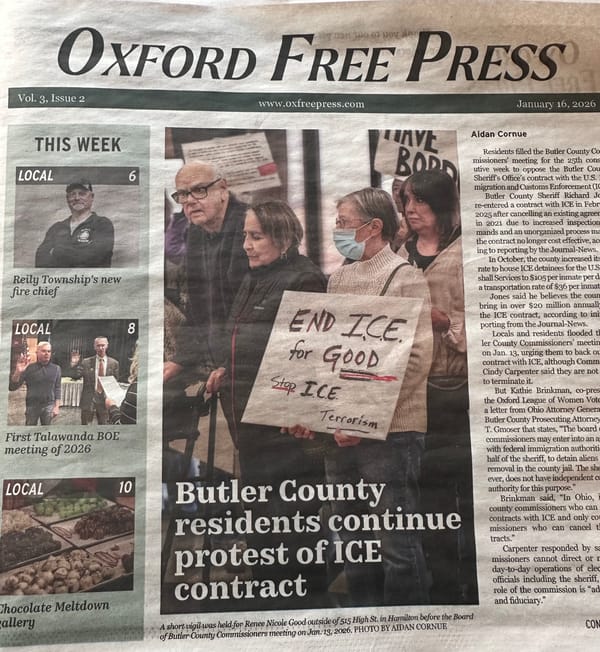The State
While I regret the impact that these firings have on former employees of the executive branch, that is really the least interesting aspect of this story.
As thousands of federal workers have been fired in recent weeks, the media has been more concerned with the personal implications of these job losses than with the impact of the loss of the functions that these employees previously fulfilled. We hear constantly that these federal workers "have mortgages," as if the reason we should be concerned about these firings is that former federal workers might not be able to pay their bills. While I regret the impact that these firings have on former employees of the executive branch, that is really the least interesting aspect of this story. What role were these employees playing in the wider bureaucracy? What happens when they are no longer playing that role? These are the questions that my posts will address in the near future.
In order to dig into those questions, we need to address the concept of the state. What is it? And what happens when it does not fulfill its functions? The nature of the state has been debated for more than a century. One of the first analyses of the state was offered by Max Weber in a 1918 speech titled "Politics as vocation." He discussed how we can't really define a state by its functions, since the functions of the state are limitless. He thought instead the state should be defined by what is unique to it, and that is its relationship to force. He wrote,
"Sociologically, the state cannot be defined in terms of its ends. There is scarcely any task that some political association has not taken in hand, and there is no task that one could say has always been exclusive and peculiar to those associations which are designated as political ones: today the state, or historically, those associations which have been the predecessors of the modern state. Ultimately, one can define the modern state sociologically only in terms of the specific means peculiar to it, as to every political association, namely, the use of physical force."
He concluded, "Today, however, we have to say that a state is a human community that (successfully) claims the monopoly of the legitimate use of physical force within a given territory."
Because the state monopolizes force, any other use of force must be within the institutional landscape of the state, it must be permitted by the state. If a state is not able to monopolize force, if it cannot protect its citizens from actions by other citizens or by other states, then the state loses its legitimacy and fails to fulfill its social contract with citizens. This is a state's fundamental responsibility: establishing the security of its citizens and territory.
In 1933, the Montevideo Convention on the Rights and Duties of States established the legal requirements for statehood: "The state as a person of international law should possess the following qualifications: (a) a permanent population; (b) a defined territory; (c) government; and (d) capacity to enter into relations with other states."
It is the third characteristic "government" that most closely approximates what we think of when we think of as the state. The state is what performs the functions of governing society - it levies taxes, maintains armed forces, police and other organs of security, it establishes the legal system for adjudicating disputes among citizens, corporations, municipalities, and other actors. Without these functions, the state cannot fulfill its function of protecting citizens and offering them security.
The study of the state is sometimes confusing for American students because in popular discourse we call sub-federal units like Pennsylvania or Colorado "states." But in the discipline of political science we use this term differently to refer to the administrative machinery that manages contemporary political life. The term state is not a synonym with the word country either, since country also includes the citizens of a given territory. When we are talking about the state we are talking about a particular set of institutions like the armed forces, the executive, the legislative, and the judicial branches of government and all the agencies that are housed within them. The bureaucracy are those aspects of the state that implement the directives of the state, but the state and the bureaucracy are not the same thing.
The federal workers that have been fired in recent weeks were largely employees of the executive branch, the branch of government that executes laws. If the individuals that enforce laws are removed from their positions, without replacing them with individuals or institutions capable of fulfilling those same functions, which is the situation we currently have, we should anticipate a break down of law and order. If there is no one to enforce laws, laws will not be followed. If it reaches the point where the state is no longer able to provide security to citizens, then citizens have no reason to offer their loyalty to the state.
For example, the laws which govern taxation that have been passed by Congress have to be implemented by employees of the IRS (an executive branch agency housed within the Department of the Treasury). Violators of tax policy have to be identified and subject to sanction in order for the tax code to be implemented. If there is no one to implement the law, to sanction those who violate it, then the law will lose its force. Laws do not enforce themselves. While it may be possible to automate some functions currently fulfilled by individuals, that system of automation must be governed by individuals who know and understand the tax code. Automation cannot replace the bureaucracy. It can only support it.
This raises the essential question: what is going to happen to the functions that have previously been fulfilled by executive branch employees? Are these functions going to be fulfilled in some other way? Or will they be eliminated? It appears that they will be eliminated. The elimination of functions which the state previously fulfilled but is no longer able or willing to do so indicates a decline in state capacity. If the state could previously penalize violators of its tax code, but is no longer able to do so or is less able to do so than before, then the state has suffered a decline in state capacity.
While a capacity can be eliminated relatively quickly, the development of a new capacity takes considerable time and investment. The widespread elimination of functions previously occupied by the state cannot be quickly reversed (except by court order, as we have seen).
The claim that removing these functions saves the American taxpayer money is a dubious claim, since these actions are being pursued in ways that will require extensive litigation. We are therefore not saving money, we are shifting resources from maintaining state capacities to legal battles with former bureaucrats. How would you prefer your taxpayer dollars to be spent? On litigating whether or not an IRS agent was fired illegally? Or on the IRS enforcing the tax code so that all Americans pay their share of taxes?
If the Trump administration had followed the legal process for firing employees, then that would lend some credibility to its claims that it will save taxpayers money. But what we have seen is that many of these workers were reinstated by the courts and were promised back pay since the date of their firing. That means that they will be paid for a period in which they were not working (they had received "stop work" orders from the administration). This is yet another example of how the current approach actually costs, it does not save, taxpayers money. Firings at the IRS specifically cost tax-payers money, since each individual IRS worker recoups much more than their salary by enforcing tax compliance. There is also the impact of the culture of compliance that is created by widespread enforcement. The point is that the firing of federal employees is not saving American taxpayers money. It is costing them state capacities, including essential capacities such as the ability to collect taxes which are the way that we fund the entire bureaucracy.
The long-term implications of the current dismantling of the executive branch are far-reaching and devastating for state capacity, law and order, and stability. These political realities will have economic consequences. The uncertainty that such actions create causes economic downturn as business owners make increasingly conservative choices to protect their companies from an unpredictable economic landscape. We are already starting to see this economic contraction, accelerated by the trade wars being initiated by the current administration.
Put simply, the state is the foundation on which wider economic, social, and political life are built. Ruptured foundations will have far-reaching effects well-beyond whether or not federal workers can pay their mortgages. We need to see more reporting on the implications of this contraction for state capacity and for citizens. What could we previously expect from our state that it will no longer be able to provide?

